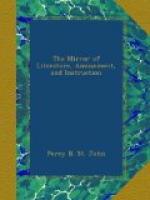To particularize Sir Walter’s contributions to periodical literature would occupy considerable space. He wrote a few papers in the early numbers of the Edinburgh Review, and several in the Quarterly Review, especially during the last ten volumes of that journal, of which his son-in-law, Mr. Lockhart, is the accredited editor. Sir Walter likewise contributed the articles Chivalry, Drama, and Romance to the sixth edition of the Encyclopaedia Britannica. Paul’s Letters to his Kinsfolk, the fruits of Sir Walter’s tour through France and Belgium, in 1815, were published anonymously; and the Field of Waterloo, a poem, appeared about the same time. We may also here mention his dramatic poem of Halidon Hill, which appeared in 1822; and two dramas, the Doom of Devergoil and Auchindrane, in 1830—neither of which works excited more than temporary attention. Sir Walter likewise contributed a History of Scotland, in two volumes, to Dr. Lardner’s Cabinet Cyclopaedia, in 1830; and in the same year a volume on Demonology and Witchcraft, to Mr. Murray’s Family Library: both which works, of course, had a circulation co-extensively with the series of which they form portions. We may here notice a juvenile History of Scotland, in three series, or nine volumes, under the title of Tales of a Grandfather, affectionately addressed to his grandchild, the eldest son of Mr. Lockhart, as Hugh Littlejohn, Esq.
ABBOTSFORD—BARONETCY.
The large sums received by Sir Walter for the copyright of his earlier works had enabled him to expend nearly one hundred thousand pounds upon Abbotsford, so as to make it his “proper mansion, house, and home, the theatre of his hospitality, the seat of self-fruition, the comfortablest part of his own life, the noblest of his son’s inheritance, a kind of private princedom, and, according to the degree of the master, decently and delightfully adorned."[12] Here Sir Walter lived in dignified enjoyment of his well-earned fortune, during the summer and autumn, and was visited by distinguished persons from nearly all parts of the world. He unostentatiously opened his treasury of relics to all visitors, and his affability spread far and wide. He usually devoted three hours in the morning, from six or seven o’clock, to composition, his customary quota being a sheet daily. He passed the remainder of the day in the pleasurable occupations of a country life—as in superintending the improvements of the mansion, and the planting and disposal of the grounds of Abbotsford; or, as Walpole said of John Evelyn, “unfolding the perfection of the works of the Creator, and assisting the imperfection of the minute works of the creature;” so as to render Abbotsford as Evelyn describes his own dear Wotton, “large and ancient (for there is an air of assumed antiquity in Abbotsford), suitable to those hospitable times, and so sweetly environed with those delicious streams and venerable woods, as in the judgment of strangers as well as Englishmen, it may be compared to one of the most pleasant seats in the nation, most tempting to a great person and a wanton purse, to render it conspicuous: it has rising grounds, meadows, woods, and water in abundance."[13]




